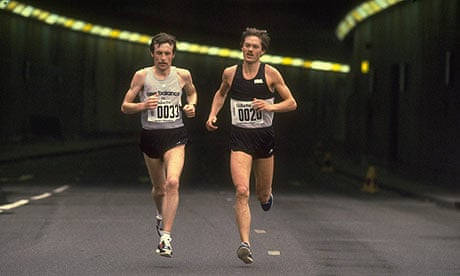When Observer writer and Olympic gold medalist Chris Brasher ran the New York marathon in 1979, he was inspired to begin a similar race in Britain. With the help of then editor Donald Trelford and members of the Greater London Council, two years later he got he got his wish.
1908: The first marathon to take place in London was part of the Olympic games. Originally planned to be 26 miles, it was extended by 386 yards so the runners would reach the finish line in front of the royal box.
1981: The first official London Marathon was run by 7,590 people, after organisers received over 20,000 applicants. American Dick Beardsley and Norwegian Inge Simonsen were first over the line - they won the men's title holding hands. Twenty-two of the original runners - the 'ever presents' - are still competing.
1982: The finish line was relocated from Constitution Hill to Westminster Bridge, due to building works. This time, 90,000 people applied to run.
1985: Steve Jones won with the fastest British time of 2:08:16, while Matthew Paris got the fastest time for an MP with 2hr32min.
1994: The chequered flag was moved once more to the Mall, where it remains.
1996: The hottest temperatures for race day were recorded, with runners competing in 22C heat.
2002: London became the first race to introduce blood tests for all elite athletes. Aged 90, Jenny Wood-Allen was the oldest woman to complete a marathon, finishing the course in 11hr34min.
2003: Paula Radcliffe broke the women's world record in 2:15:25. Her time remains unbeaten.
2004: A Kenyan double: Evans Rutto and Margaret Okayo won the men and women's titles.
2005: Paula Radcliffe stopped for a toilet break but still managed an impressive time of 2:17:42.
2006: Jade Goody ran but failed to complete and was hospitalised. Runners Katie Austin and Gordon Frye got married during the race on Tower Bridge.
2007: 22-year-old David Rogers became the ninth marathon runner to die after the race, after drinking too much water.
2008: A suspected gas leak at the Old Rose pub in Wapping diverted the course. Buster Martin, 101, became the oldest runner to complete the race, but the Guinness World Records disputed his age. His first words past the finish line were "Where's my beer?" Martin Lel from Kenya set a new world record with his 2hr5min time.
